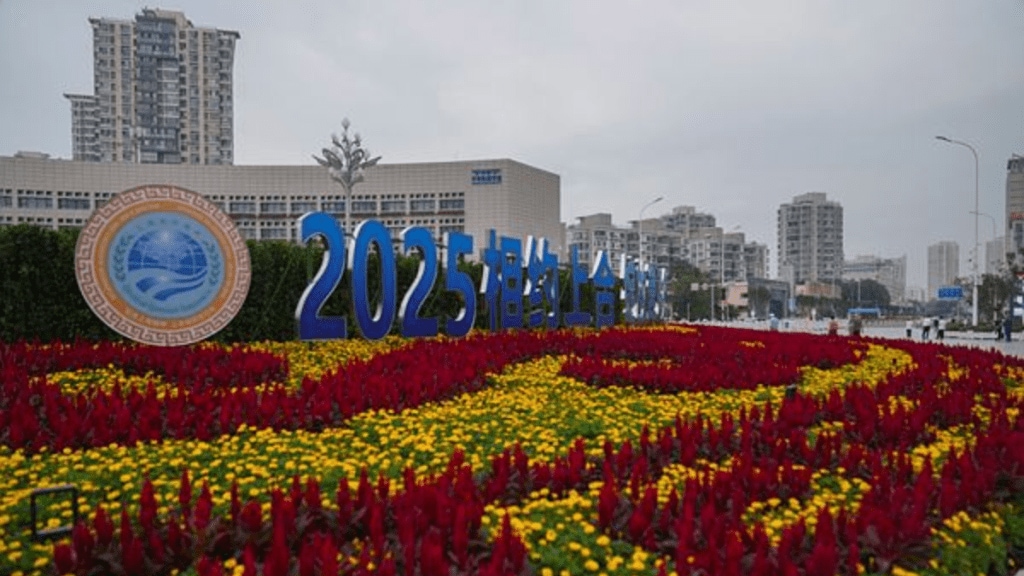PM Narendra Modi is in China for the 25th SCO summit, where he will hold meetings with China President Xi Jinping and Russia President Vladimir Putin for the next two days. Pakistan Prime Minister Shehbaz Sharif will also be a part of the SCO Summit. The summit comes hot on the heels of Trump’s tariffs – 50% against India.
This SCO Summit is of great significance as PM Modi, Xi, and Putin may coordinate their response to Trump’s new tariffs on India and sanctions on Russia. The leaders of three nations may also explore ways to reduce reliance on the US dollar through initiatives like expanding BRICS financial systems and boosting energy trade. With new members such as Saudi Arabia and Iran, BRICS now has greater global influence and is also expected to discuss reforming international institutions.
For India, the summit offers a chance to deepen trade ties, connectivity, and counter-terrorism cooperation while balancing mounting tariff tensions. For China and Russia, it serves as a platform to strengthen their leadership in the Global South and project unity against Western influence. Modi’s presence also signals India’s attempt to keep dialogue open with China despite border tensions.
What is SCO?
The Shanghai Cooperation Organisation (SCO) is an alliance comprising ten member states and is headed by the Heads of State Council (HSC). It was founded in Shanghai in 2001 by China, Kazakhstan, Kyrgyzstan, Russia, Tajikistan, and Uzbekistan. Later on, India, along with Pakistan, Iran, and Belarus, went on to become a part. The bloc focuses on regional security issues, economic cooperation and more.
At present, it represents 42% of the global population, 23% of global nominal GDP and around 36% of global GDP in purchasing power parity (PPP) terms as of 2024.
The SCO traces its roots to the “Shanghai Five,” formed in 1996 by China, Kazakhstan, Kyrgyzstan, Russia, and Tajikistan to strengthen border security and regional trust. In June 2001, these countries, joined by Uzbekistan, met in Shanghai to establish the SCO.
Over the years, SCO built partnerships with many international organisations, including the UN, ASEAN, CIS, and CSTO, and expanded cooperation in counterterrorism through its Regional Anti-Terrorist Structure (RATS).
Significance of SCO
It serves as a counterbalance to West-led institutions such as NATO, the World Trade Organisation, and the International Monetary Fund, with its primary focus on security issues concerning Asian nations. Both Russia and China see the SCO as a platform to position themselves as an alternative to these Western alliances.
For Central Asian states, Russia continues to hold influence as a traditional power, while China has been expanding its foothold by tapping into the region’s vast oil and gas reserves. Beijing has strengthened its presence through large-scale infrastructure investments under various development initiatives.
Since becoming a full member of the SCO, India has introduced several new initiatives to strengthen collaboration within the bloc. India launched the first SCO Startup Forum, established a Special Working Group on Startups and Innovation, a Sub-Group dedicated to Traditional Medicine, the SCO Young Scientists Conclave, and the Consortium of Economic Think Tanks.
At the same time, India has also benefited from SCO’s existing mechanisms. For instance, the Regional Anti-Terrorist Structure (RATS) has played a key role in supporting member states by facilitating joint counter-terrorism drills, assessing intelligence inputs from different countries, and enabling information exchange on terrorist activities and drug trafficking networks.
Heads of State
As of the July 4, 2024, meeting, the Shanghai Cooperation Organisation’s Council of Heads of State includes Aleksandr Lukashenko, Belarus; Xi Jinping, China; Narendra Modi, India; Masoud Pezeshkian, Iran; Kassym-Jomart Tokayev, Kazakhstan; Sadyr Japarov, Kyrgyzstan; Shehbaz Sharif, Pakistan; Vladimir Putin, Russia; Emomali Rahmon, Tajikistan; and Shavkat Mirziyoyev, Uzbekistan.
Observer states and dialogue partners
Mongolia and Afghanistan are observer states. The bloc also has dialogue partners. These are – Sri Lanka, Turkey, Cambodia, Azerbaijan, Nepal, Armenia, Egypt, Qatar, Saudi Arabia, Kuwait, Maldives, Myanmar, United Arab Emirates, Bahrain.

